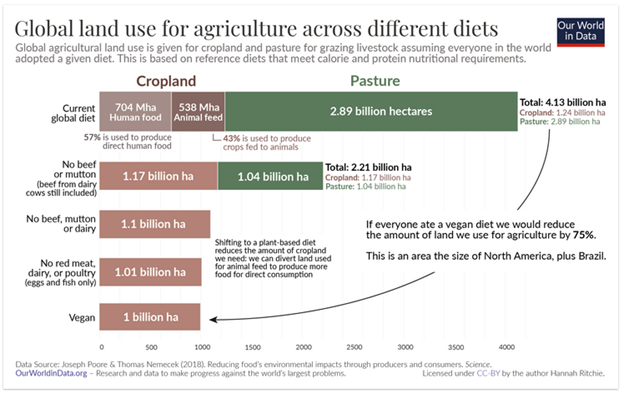this is based on poore-nemecek 2018, a paper so fraught with methodological faux pas as to be a warning to anyone trying to do a metastudy.
Following the trail of your comment: https://ourworldindata.org/land-use-diets does indeed cite https://www.science.org/doi/10.1126/science.aaq0216, but I'd love it if you could provide more details on your criticisms of methodology.
this paper is over half a decade old, and i've been whining about it pretty much that whole time, but i don't recall the last time i actually dug into the methodology. to my recollection, they call it a metastudy and they compare LCAs from disparate studies, but LCAs themselves are not transferable between studies. that's just one point.
if i recall correctly, they also used some california water study as the basis of their water use claims, but the water use included things like cottonseed, which is not grown for cattle feed, and using it in cattle feed is actually a conservation of resources. cotton is a notoriously light and water-demanding crop, so using the heavy byproduct to add to the water use of california dairies is, to me, dishonest.
i have no doubt that if i were to slice up this paper citation-by-citation, every one of them would have some misrepresented facts or methodology being repackaged as, i don't say this lightly, vegan propaganda.
Dug up the paper in question for anyone curious: https://sci-hub.se/https://www.science.org/doi/10.1126/science.aaq0216. At a cursory glance, I'm not seeing any of the referenced concerns. But, y'know, down vote away I guess.
So what's a better study or metastudy? The actual results, aside from poultry being weirdly low-resource, seem about right when you consider the way energy usually moves through food webs.
That's "Life Cycle Assessment", for anyone else that's wondering.
So what’s a better study or metastudy?
personally, i believe that attempts to quantify any complex system into discrete metrics is likely to have blind spots and misunderstand the system as a whole. i think that if you are concerned about the environmental impacts of agriculture, the correct approach is to evaluate each operation on its own and try to optimize it for inputs and outputs.
You can probably see how actual statistics are useful for policy or public discussion, though, right?
We aren't going to fix any big picture problem by leaving it up to the businesses pedaling whichever product. Like, you wouldn't apply that to an oil well, would you?
I can see how politicians and bureaucrats would prefer statistics, but I don't believe that's a good source for public policy myself, no.
And priests prefer faith. How do you think it should work?
If you're against science as a concept maybe I shouldn't even bother.
The actual results
are meaningless, because they misuse the source data.
Looks like we could change to just eating poultry and have roughly the same effect
Poultry is definitely the more climate friendly of the meats but it doesn't come without problems
There's still increased risks of pandemic with factory farmed chickens and most chickens are raised in inhumane conditions
Think of all the parking lots we could build with that land!
I suppose this doesn't take into account more humane animal farming? Like not keeping a million chickens and three long barns? Or pigs with a livable space?
Yeah, that would make it even worse. I'm not sure by how much though, because like the other person said this is representative of cropland.
They still haven't figured out a way to humanely slaughter animals let alone keep them in fulfilling environments that would be impossible to tell from their wild counterparts.
We can't afford to let animals live full lives. Pigs are butchered at 6 months but can live decades naturally.
We haven't even begun to approach the conversation of maybe possibly being able to in the maybe distant future being able to consider a humane way to keep animals and then also harvest meat from them when they pass.
I've been avoiding poultry for fucking nothing? I'm gonna go eat a thousand chicken nuggies
What's new to me in this data is that the increase in cropland for humans for a vegan diet is still less that what we currently feed to animals in spite of the enormous amount of pasture they also require.
except that the food that is fed to livestock is largely crop seconds or parts of crops that people can't or won't eat. so we need to find a whole other use for those parts of the plants or accept it as waste.
I know a lot of people who grow feed on prime agricultural land. Like, can you eat alfalfa? Have you ever tried feed varieties of maize?
people definitely eat alfalfa sprouts. to be clear, i didn't say no land is used explicitly for feed, but much of the land that is used for growing feed is actually growing some crop that will produce multiple products, with feed being only one of them.
Yeah, I like alfalfa sprouts too. That's not what the fields here are full of though.
It's not my lived experience that it's all or even mostly byproducts. Unless you have hard numbers, that seems like the meat industry equivalent of "the climate has always changed".
Yep. As a rule of thumb, 1/10th of the energy makes it to the next trophic level in any food chain. We might be doing better than that, but you're still going to to be wasting a lot of land at 30% end-to-end efficiency.
Data is Beautiful
Be respectful
